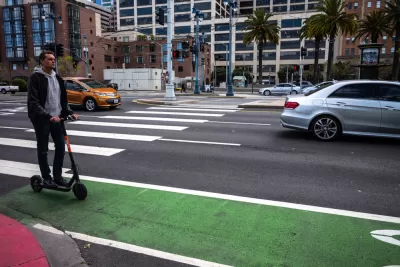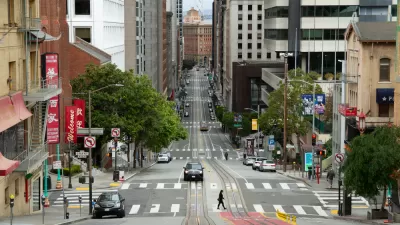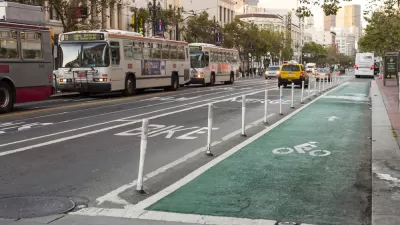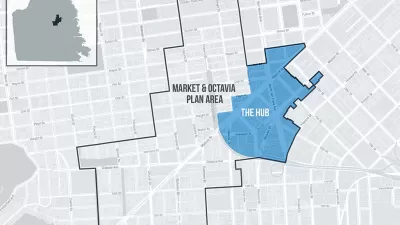San Francisco hoped a competitive permitting process would ensure considerations of equity in the operations of scooters in the city. The results haven't lived up to expectations.

Johanna Bhuiyan reports a scoop about the operations in San Francisco of the Scoot Networks electric scooter rental company.
"The company has drawn a red line around the centrally located but poverty-ravished Tenderloin and in parts of nearby Chinatown, preventing customers from dropping off scooters there," reports Bhuiyan.
The issue raised by the revelation is that Scoot Networks promised to deliver service on a more equitably than other providers. Instead, Scoot Networks had flagged seven "communities of concern" including the Tenderloin and Chinatown.
Scoot and another company, Skip, beat out better-funded rivals, Lime and Bird, to win a limited number of permits to operate in San Francisco, after a high profile competition that took place in 2018.
Bhuiyan explains the criteria that won Scoot the right to operate in San Francisco:
In evaluating applications for the pilot program, SFMTA specifically scored the companies on whether they included an “approach to providing service to low-income residents, including diverse payment options and fare discounts,” and whether they would serve areas “beyond the downtown core” and be committed to ensuring “availability of scooters in underserved areas.” Scoot and Skip beat out a bevy of better-funded rivals, including Bird and Lime, with the agency praising them for track records that “demonstrated not only a commitment to meet the terms of the permit, but a high level of capability to operating a safe, equitable and accountable scooter share service.”
Bird has since purchased Scoot, and most customers using Scoot and Skip in the city are, "predominantly white men who have a household income of $100,000 or more," according to survey data released by the SFMTA in April 2019 [pdf].
Since Bhuiyan reported the scoop, Joe Fitzgerald followed up on Bhuiyan's reporting with a new scoop. The transportation advocacy group Chinatown TRIP said they asked for scooters to be blocked from the area:
That’s because Stockton Street in Chinatown is a busy pedestrian thoroughfare trafficked by locals shopping in the area’s many shops, and is among the most heavily trafficked pedestrian corridors in The City. Walking is the primary mode of travel in Chinatown, according to the 2009-2013 American Community Survey.

Planetizen Federal Action Tracker
A weekly monitor of how Trump’s orders and actions are impacting planners and planning in America.

Maui's Vacation Rental Debate Turns Ugly
Verbal attacks, misinformation campaigns and fistfights plague a high-stakes debate to convert thousands of vacation rentals into long-term housing.

San Francisco Suspends Traffic Calming Amidst Record Deaths
Citing “a challenging fiscal landscape,” the city will cease the program on the heels of 42 traffic deaths, including 24 pedestrians.

Trump Prompts Restructuring of Transportation Research Board in “Unprecedented Overreach”
The TRB has eliminated more than half of its committees including those focused on climate, equity, and cities.

Amtrak Rolls Out New Orleans to Alabama “Mardi Gras” Train
The new service will operate morning and evening departures between Mobile and New Orleans.

The Subversive Car-Free Guide to Trump's Great American Road Trip
Car-free ways to access Chicagoland’s best tourist attractions.
Urban Design for Planners 1: Software Tools
This six-course series explores essential urban design concepts using open source software and equips planners with the tools they need to participate fully in the urban design process.
Planning for Universal Design
Learn the tools for implementing Universal Design in planning regulations.
Heyer Gruel & Associates PA
JM Goldson LLC
Custer County Colorado
City of Camden Redevelopment Agency
City of Astoria
Transportation Research & Education Center (TREC) at Portland State University
Jefferson Parish Government
Camden Redevelopment Agency
City of Claremont





























